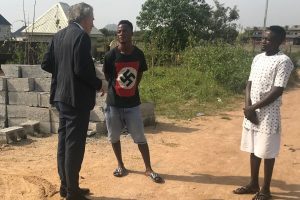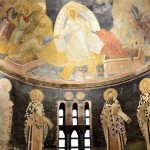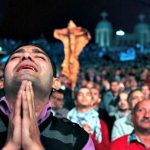By Bernard-Henri Lévy – The Wall Street Journal –
Fulani raiders ‘are Islamic extremists of a new stripe, more or less linked with Boko Haram,’ but present throughout Nigeria.
A slow-motion war is under way in Africa’s most populous country. It’s a massacre of Christians, massive in scale and horrific in brutality. And the world has hardly noticed.
A Nigerian Pentecostal Christian, director of a nongovernmental organization that works for mutual understanding between Nigeria’s Christians and Muslims, alerted me to it. “Have you heard of the Fulani?” he asked at our first meeting, in Paris, speaking the flawless, melodious English of the Nigerian elite. The Fulani are an ethnic group, generally described as shepherds from mostly Muslim Northern Nigeria, forced by climate change to move with their herds toward the more temperate Christian South. They number 14 million to 15 million in a nation of 191 million.
Among them is a violent element. “They are Islamic extremists of a new stripe,” the NGO director said, “more or less linked with Boko Haram,” the sect that became infamous for the 2014 kidnapping of 276 Christian girls in the state of Borno. “I beg you,” he said, “come and see for yourself.” Knowing of Boko Haram but nothing of the Fulani, I accept.
The 2019 Global Terrorism Index estimates that Fulani extremists have become deadlier than Boko Haram and accounted for the majority of the country’s 2,040 documented terrorist fatalities in 2018. To learn more about them, I travel to Godogodo, in the center of the country, where I meet a beautiful woman named Jumai Victor, 28. On July 15, she says, Fulani extremists stormed into her village on long-saddle motorcycles, three to a bike, shouting “Allahu Akbar!” They torched houses and killed her four children before her eyes.

Bernard-Henri Lévy speaks to Fulani men in Nigeria. PHOTO: GILLES HERTZOG
When her turn came and they noticed she was pregnant, a discussion ensued. Some didn’t want to see her belly slit, so they compromised by cutting up and amputating her left arm with a machete. She speaks quickly and emotionlessly, staring into space as if she lost her face along with her arm. The village chief, translating for her, chokes up. Tears stream down his cheeks when she finishes her account.
I venture north to Adnan, where Lyndia David, 34, tells her story of survival. On the morning of March 15, rumors reached her village that Fulani raiders were nearby. She was dressing for church as her husband prepared to join a group of men who’d stand watch. He urged her to take refuge at her sister’s home in another village.
Her first night there, sentinels woke her with a whistle. She left the house to find flames spreading around her. Fulani surrounded her. Then she heard a voice: “Come this way, you can get through!” She did, and her putative savior leapt out of the underbrush, cut three fingers off her right hand, carved the nape of her neck with his machete, shot her, doused her body with gasoline, and lit it. She somehow survived. A few weeks later she returned to her village and learned that the raiders had leveled it the same night. Her husband was among the 72 they murdered.
The Christian Middle Belt is a land of blooming prairies that once delighted English colonizers. On the outskirts of Jos, capital of Plateau state, I visit the ruins of a burned-down church. I spot another, intact. A man emerges to yell at me in English that I don’t belong there. Stalling, I learn that he is Turkish, a member of a “religious mutual assistance group” that is opening madrassas for the daughters of Fulani.
That day I crisscross the Middle Belt. Roads are crumbled, bridges collapsed; destroyed houses cast broken shadows over tree stumps and trails of black ash and blood. Maize rots in the abandoned fields. The local Christians have been killed or are too terrorized to come out and harvest it. In the distance are clusters of white smudges—the Fulani herds grazing on the lush grass. When we approach, the armed shepherds wave us off.
The Anglican bishop of Jos, Benjamin Kwashi, has had his livestock stolen three times. During the third raid he was dragged into his room, a gun to his head. He dropped to his knees and prayed at the top of his voice until the thrumming of a helicopter drove his assailants off.
Bishop Kwashi describes the Fulani extremists’ pattern: They usually arrive at night. They are barefoot, so you can’t hear them coming unless they’re on motorcycle. Sometimes a dog sounds the alert, sometimes a sentinel. Then a terrifying stampede, whirling clouds of dust, cries of encouragement from the invaders. Before villagers can take shelter or flee, the invaders are upon them in their houses, swinging machetes, burning, pillaging, raping. They don’t kill everyone. At some point they stop, recite a verse from the Quran, round up the livestock and retreat. They need survivors to spread fear from village to village, to bear witness that the Fulani raiders fear nothing but Allah and are capable of anything.
The heads of 17 Christian communities have come to the outskirts of Abuja, Nigeria’s federal capital, to meet me in a nondescript compound. Some have traveled for days in packed buses or minivans. Each arrives accompanied by a victim or two.
Here they are, an exhausted yet earnestly hopeful group of some 40 women and men, keenly aware of the moment’s gravity. One carries a USB key, another a handwritten account, a third a folder full of photos, captioned and dated. I accept these records, overwhelmed by the weight of the bearers’ hope that the world will recognize the horrors they experienced.




